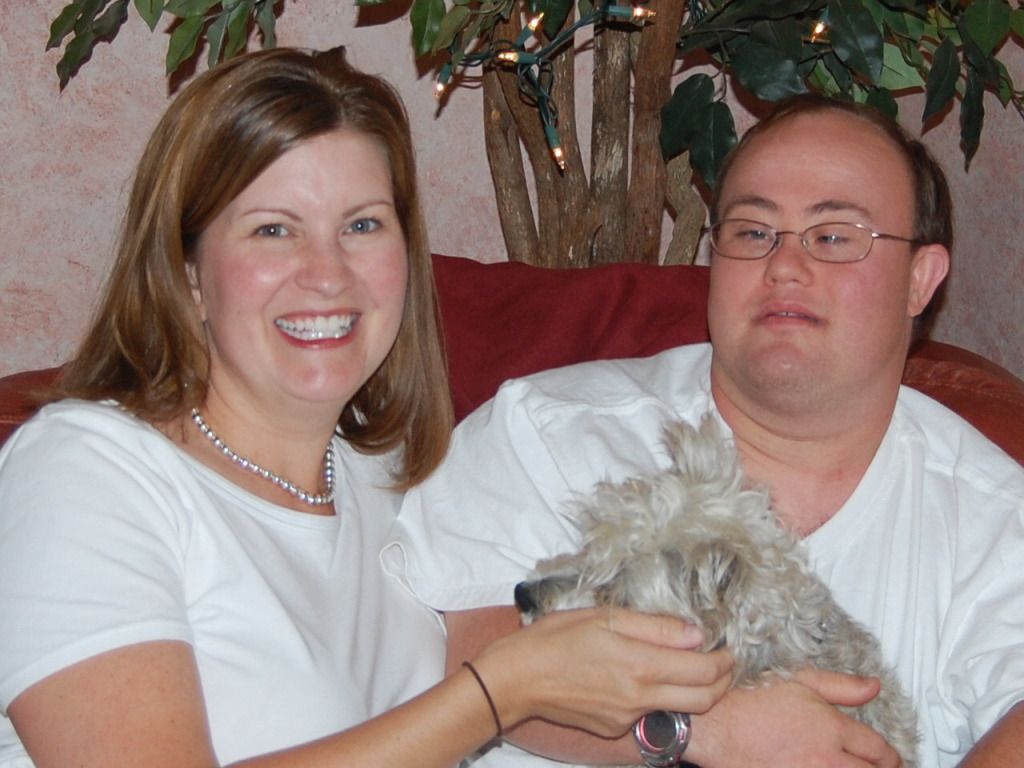 |
| Saturday afternoon, preparing to ride a pony at the DSANV pumpkin pick |
Today is very exciting for me! I just discovered, through a random commenter on another post, that my post,
Advocate, is now up on
Mamapedia for the next 3 days! Hooray!! And thank you to the folks at Mamapedia for giving me this opportunity.
I realized that I had a lot more questions from my Q&A than I'd originally thought, and, being a fairly long-winded person, I have long-winded answers. Here are two more questions I've got answers for, with more to come in the upcoming days!
Q:
As a student midwife, I always wonder how the attitudes and reactions of healthcare professionals impact parents of children with special needs, particularly in the early days. Is there anything you would change about your postnatal experiences if you could? Is there anything that could have been done better to support you?
A. I hear way, way too often, horror stories of people's immediate post-natal experiences when having a baby with Down syndrome and no prenatal diagnosis. I've heard of bleak outlooks being spewed by uninformed healthcare professionals, proclamations of "
I'm so sorry," coupled with a
here's your baby, have a nice life kind of attitude, devoid of any useful information or resources to help new parents on their way. This always makes me so sad, makes me realize that there are still no many unenlightened, stuck-in-the-dark-ages doctors and nurses out there, who just need someone to show them the
real truth. Not that Down syndrome doesn't come with its challenges or health issues, because it certainly
does, but to give a new and emotionally vulnerable parent so much negativity, without so much as a hearty
Congratulations on your new baby! or a link to a local Down syndrome association as a reference is unconscionable.
Our situation was what
I recall to be a little unusual at the beginning. When Samantha was born, I was actively
looking for markers, asked, while still in the delivery room, how long before we'd know if she had Down syndrome. I don't know why, but it was just a
feeling, before I even saw her. The doctor, not expecting to hear that, took a closer look at my baby, said "
Hmmm..." and walked out of the room. Steve cornered the L&D nurse outside a little bit later, asked her if she thought Sammi had Down syndrome. Slightly nervous at delivering that kind of news, as it's not her position to do so, she nodded.
I don't actually recall any doctor coming to formally tell us. Once Steve let it be known that we knew, the ball began to roll, the visits from cardiologists, social workers and who-remembers-else began. While I am, in retrospect, a little bit disappointed that nobody came to sit with me and tell me outright in a professional capacity
, we still felt supported by the hospital and its staff. They all gave us congratulations, the packet we received from the social worker was packed full of useful new parent information and resources, and the nursery staff all bickered over who would get to cuddle and rock my baby when she was away from us. They, too, felt a need to protect her.
While my experience was good, many hospitals and healthcare professionals still have a
lot to learn about this kind of thing. I hope their eyes can be opened by other parents and advocates...
Q
. Does Sammi have any friends? Does she have DS and non DS friends? Always curious what other moms do...
A. Ooh, this is a tough one. And one I kind of ignore, mentally, to myself, avoiding the honest truth of the matter. And the honest truth of the matter is that Sammi
does have
two types of "friends." She has the
real friends, or, rather, the ones I
know to be "real" friends, who
do have Down syndrome. We have playdates, she talks about them when they're not around, and she gets so excited to get to play with them. I don't know if it is an
instinctive connection, or if it's just because
I seek those kinds of friendships out for her. They're easier to maintain, easier to understand, and I don't have to worry about what the other child thinks about her, if they're wondering why she doesn't talk like they do, play like they do, etc. And I, myself, feel a stronger connection to their parents. The
other type of friends she has are the ones at school, the
typical friends. But because I'm not at school with her, I really can't attest to the
nature of those friendships. Her aides and teachers all tell me that she sits with them at lunch, and that they're all very good with her, but I think it may be more of a
protective, older/younger kind of relationship structure. We don't get invited to their birthday parties, or for playdates, and, to be honest yet again, I don't know how well either would go anyway. I am not sure if I'm protecting
her, or protecting
me. I'm happy they look out for her. I'm happy they're kind to her. I'm happy they humor her. But what else do I want? I want fulfilling friendships, ones that she can relate to, ones that I can trust. And that leaves me...
where? I'm not sure. I think Samantha will have to pave the way with her peers at school, to determine for herself what the nature of those friendships will be.










































